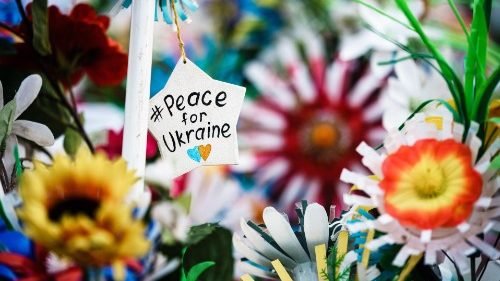Our Editorial Director, Andrea Tornielli, reflects on the 1,000th day of Russia’s war in Ukraine and the need for diplomatic efforts to achieve peace.
By Andrea Tornielli
It has been one thousand days since February 24, 2022, when the Russian Federation’s army, under the orders of President Vladimir Putin, attacked and invaded Ukraine.
They have been one thousand days marked by an incalculable—but staggering—number of deaths, both civilian and military, as well as innocent victims, including children killed in the streets, in schools, and in their homes.
These one thousand days were filled with hundreds of thousands of wounded and traumatized individuals, many left permanently disabled, and families left homeless, leaving a nation martyred and devastated.
Nothing can justify this tragedy, which could have been avoided if everyone had placed their bets on what Pope Francis calls “patterns of peace,” rather than succumbing to the presumed inevitability of conflict.
This war, like every other, is always accompanied by vested interests—chiefly, the global arms industry, a business that knows no crisis and has thrived even during the recent pandemic, in both East and West alike.
The somber milestone of one thousand days since the beginning of the military aggression against Ukraine should prompt a single question: How can this conflict be ended? How can we achieve a ceasefire and, eventually, a just peace? How can negotiations—the “honest talks” recently referred to by the Successor of Peter—be initiated to reach “honorable compromises” and put an end to a harrowing spiral that risks dragging the world toward the abyss of nuclear war?
We cannot turn a blind eye. The diplomatic landscape seems lifeless, with little to inspire hope beyond the electoral promises of the newly-elected President of the United States.
However, a truce—and subsequently, negotiated peace—should be a goal pursued by all and cannot rest on the commitments of a single leader.
What, then, can be done? How can Europe, in particular, reclaim a role worthy of its history and of the leaders who, in the postwar period, built a community of nations that guaranteed decades of peace and cooperation on the Old Continent?
Instead of focusing on a frenzied arms race and military alliances that seemed obsolete relics of the Cold War, the West might consider the growing number of nations that do not align with this framework.
There are countries that have maintained and even strengthened high-level relations with Russia.
Why not explore, in depth, the possibilities of finding common paths to peace? Why not develop diplomatic actions and sustained dialogue through regular, non-bureaucratic, and meaningful consultations with these nations?
If European chancelleries struggle to embark on this path, could there be a greater role for Churches and religious leaders?
Beyond official contacts, which have been reduced to a trickle, nations that provide Ukraine with financial and military support might also be expected to take more initiative in analysis and proposals.
There is an urgent need for international think tanks that can dare to envision, propose, and outline viable, concrete solutions for peace acceptable to all.
As Cardinal Secretary of State Pietro Parolin told Vatican News to mark the anniversary, the world needs “statesmen with a long-term vision, capable of courageous acts of humility, and of thinking for the good of their peoples.”



